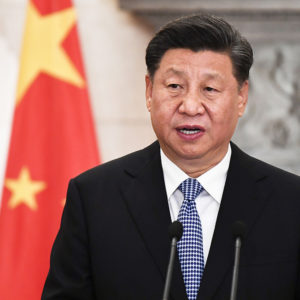The outcries of right versus left in the halls of the U.S. Congress over the alleged “high crimes and misdemeanors” of Donald Trump obscured one issue on which both the former U.S. president and President Joe Biden agree. While Biden has signed numerous documents undoing Trump’s decisions, including withdrawal from the Paris climate accord and withdrawal of 12,000 U.S. troops from Germany, they both look with suspicion, if not hostility, on China.
That coincidence in outlook reflects widespread concern about China’s rising power and influence from the Yellow Sea and the Korean peninsula to the Indian Ocean and beyond.
Biden’s secretary of state, Antony Blinken, has endorsed the view of his predecessor, Mike Pompeo, regarding suppression of the Muslim Uighur population in China’s northern and northwestern regions. There’s not much the U.S. can do for the Uighurs, aside from issue statements and demand action in the United Nations, none of which will deter the Chinese from their campaign against them. But Biden faces tough decisions if the Chinese seriously aggress against countries and peoples where the U.S. has vital interests.
One obvious point of contention is Taiwan, which China claimed as Mao Zedong’s forces finished their takeover of the Chinese mainland in 1949. Mao and his successors have been shaking their fists from their side of the Formosa Straits ever since the Nationalist Chinese forces of Chiang Kai-shek escaped the Red Army by fleeing to the island redoubt. The U.S. is committed to standing up for Taiwan, but we can only hope the day will never come when the Chinese translate their rhetoric into war.
Long-running acrimony over Taiwan relates to conflict over half a dozen small islands known as the Senkaku to Japan and Diaoyu to China. Japan occupies this unpopulated cluster in the East China Sea, fending off Chinese fishing boats with water cannon fired by coast guard vessels. China claims the islands just as it does Taiwan, which also claims them, but not fiercely.
Other disputes are in danger of boiling over as well. The U.S. will go on defying China’s claim to the South China Sea, sending warships there from time to time in a show of defiance that provokes Chinese threats short of open conflict. The Chinese have built bases on several islets while other countries hold their own stakes in those disputed waters. These include the Philippines, Vietnam, Malaysia, Brunei, also Taiwan, whose Nationalist China troops were occupying two islets when Mao took over the mainland and never left them.
Then there’s China’s drive to build routes from western China to Southeast Asia and the Indian Ocean. China has built a road across the high Himalayas into Pakistan leading to the Arabian Sea port of Gwadar, and it’s also planning a rail link through Myanmar to the Bay of Bengal. These projects link China to “the string of pearls,” the Chinese-built ports embracing the region. Western analysts love that term, sardonically conjuring the long-range military as well as commercial implications of China’s Belt and Road Initiative. This “new silk road” for exporting the riches of China to the world, reminiscent of the ancient silk road carrying silken treasures and opium from China to Europe, arouses fears of Chinese domination from Southeast Asia through the Indian subcontinent and the middle east to Africa.
China’s expansionist drive has grave implications for the Korean peninsula. North Korea has been a Chinese protectorate since the Korean War when the Chinese rescued the North from American and South Korean forces advancing to the Yalu (Amnok) and Tumen rivers. The Chinese, guaranteeing North Korea’s military security and economic survival despite sanctions, may not like the North’s nuclear program but are not going for a deal that would undermine the survival of the Kim dynasty and its third-generation dictator, Kim Jong-un.
China’s support of North Korea places the U.S. at odds with South Korea, whose President Moon Jae-in hopes to strengthen relations with China in hopes that China’s President Xi Jinping will foster North-South reconciliation.
As South Korea’s biggest trading partner, China exercises incredible influence over both Koreas. For Biden, the goal is to challenge China while maintaining the U.S. alliance with South Korea. Moon’s strategy is to get along with the South’s ally, the U.S., while currying favor with China. Regardless, no one should imagine appeasement of North Korea, as Trump did in his summitry with Kim, is going to succeed in persuading the North to give up its nukes and missiles.

